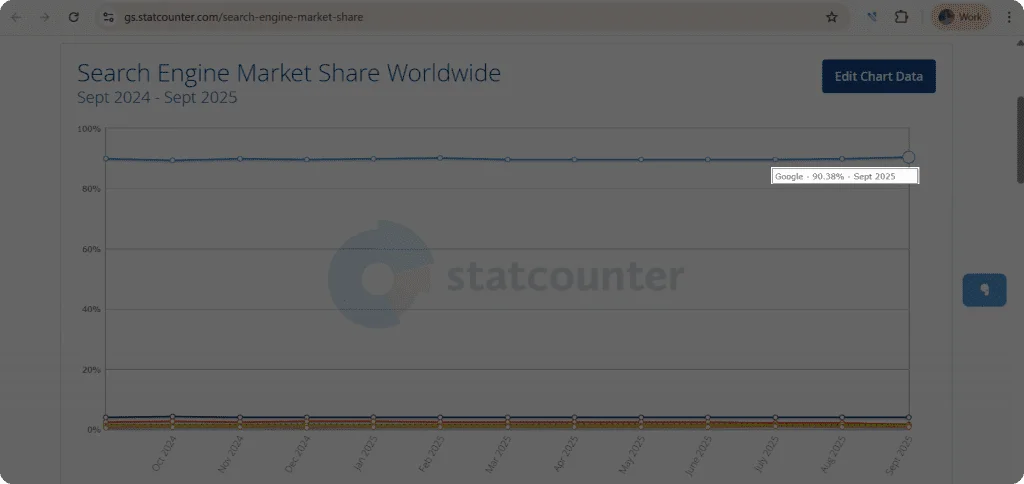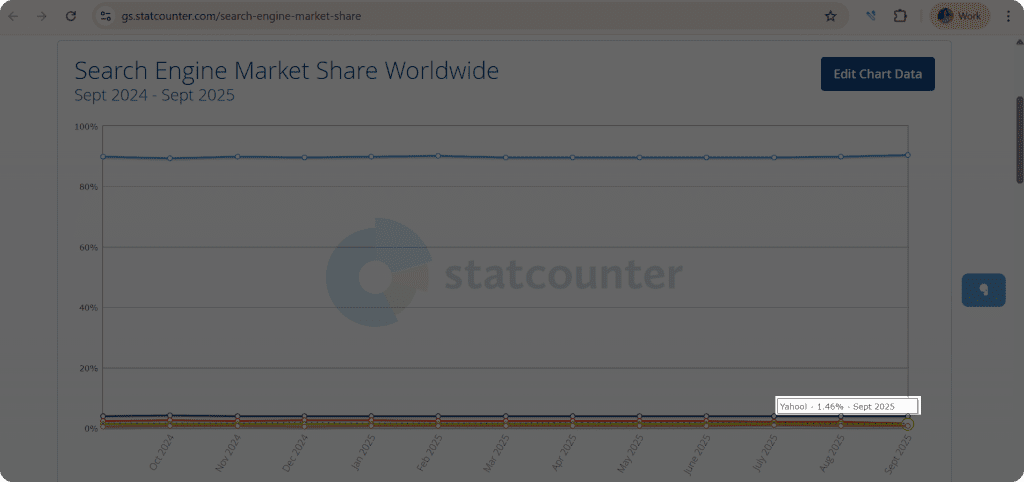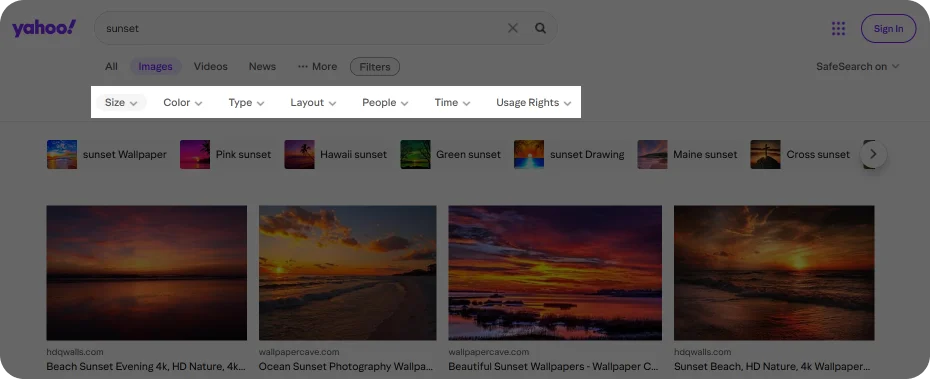Search engines have become part of our daily lives. Whether it’s checking the weather, finding a recipe, reading the news, or learning a new skill, we turn to them with all our questions.
But with so many options nowadays, it can be hard to decide which one truly delivers the best results.
In this guide, we’ll review the most popular search engines, explain what makes each one special, and help you find the one that best suits your needs.
How We Chose the Best Search Engine?
Before diving into the list, it’s important to understand how search engines are evaluated.
Here are the main points that have been taken into consideration:
Relevance of Results
The main job of a search engine is to show accurate results. If it gives links that are not useful, it makes searching harder.
Good search engines let you filter results by time, location, or language. Some can also remember what you searched for before to give better results next time.
For example, if someone often looks for “vegan recipes,” the search engine may show plant-based blogs first when they search for “quick dinner ideas.”
This makes it much easier for users to find what they are looking for.
Interface and User Experience
A search engine’s design plays a big role in how easy and pleasant it is to use.
For instance, a clean and simple interface with a clear search box and straightforward results makes it easy to find what you need.
Most search engines also display results in pages rather than endless scrolling. This page-by-page layout can be helpful because it shows how many results there are and makes it easy to go back to previous pages.
It ultimately comes down to personal preference. Some users prefer a minimal design that gets them directly to answers, while others like a structured page layout that separates results clearly.
User Privacy
Privacy is a crucial factor for many people when selecting a search engine.
Some of the leading search engines in the USA do not track user activity or store search history, which means your searches remain private and are not linked to your identity.
In addition, they avoid creating personal profiles for advertising purposes, so users won’t see targeted ads based on their search habits.
Some search engines also offer features like anonymous browsing, tracker blocking, and the option to disable personalization entirely.
Choosing a search engine that prioritizes privacy can give users more control over their information.
Integration with Other Tools
Some search engines go beyond just showing web results and can connect with other tools to make searching more productive.
Certain engines can search through your emails, cloud storage, or calendars, allowing you to find documents, messages, or events directly from the search bar.
Other engines include AI assistants that can answer questions, summarize information, generate content, or even assist with creative tasks such as image creation.
These integrations help users save time and complete tasks more efficiently without switching between multiple apps.
Top Search Engines
Let’s look at the top search engines this year and what makes each one stand out.
1. Google
Google has been the world’s most popular and best search engine since 1998 and continues to dominate the market.
As of 2025, Google holds about 90.38 percent of the global search engine market across all devices, including desktop, mobile, and tablet, according to StatCounter Global Stats.

It also handles over 3.5 billion searches every day based on data from Internet Live Stats.
Google is popular because it combines speed, accuracy, and simplicity.
Its ranking algorithms have evolved over the years, now using AI and machine learning to understand search intent and context. This helps users find exactly what they are looking for in the fastest way possible.
Google also works well with many other tools.
You can access Gmail, Google Drive, Google Maps, YouTube, and Google Calendar directly through search results or integrations, making it easy to find emails, documents, directions, or videos without leaving the search engine.
This makes searching faster and more convenient.
2. Bing
Microsoft’s Bing is the second-best search engine, after Google.
According to StatCounter Global Stats, it has a global market share of about 4.1 percent in 2025, as you can see in the image below.

While it is much smaller than Google, Bing offers several unique features that make it interesting for users.
One of its biggest advantages is the built-in AI assistant, Copilot.
This tool lets you ask questions, chat with AI, create content, or even generate images directly within the search engine. You can also send voice queries or use creative tools, making searches more interactive and versatile.

What’s more, Bing’s homepage is visually appealing, featuring a new background image every day.
Its search box can also handle longer queries than many other search engines, which is useful for detailed questions or complex searches.
Although Bing has struggled to match Google’s popularity, its AI tools and Copilot integration make it an appealing choice for users who want AI-powered results and a more engaging search experience.
3. Yandex
Yandex is Russia’s leading search engine. It holds about 1.65 percent of the global search market in 2025, according to StatCounter.

While its global share is small, it dominates searches in Russia.
According to research, around 66 percent of users prefer it for Russian-language queries. Google holds roughly 30 percent in the same market.
Yandex is popular because it is fast, reliable, and offers tools designed specifically for Russian-speaking users.
Many users look up how to use Yandex to explore its local search features, email, maps, and other built-in tools, making it easy to find information, directions, or services within Russia.
4. Yahoo!
Yahoo! may seem like an older search engine, but it still attracts users who prefer a simple and clean design. In 2025, Yahoo! holds about 1.46 percent of the global search market, according to StatCounter, as you can see in the screenshot below.

One of Yahoo!’s strengths is its image search, which offers advanced filters to refine results.
Users can sort images by file size, color, type, layout, people, time, and usage rights, making it easier to find exactly what they need for projects, presentations, or social media posts.
Here’s an example search below:

Yahoo! also provides quick links to related searches, helping users explore topics without leaving the results page.
The interface is minimal and straightforward, which appeals to people who want fast access to information without distractions.
Last but not least, Yahoo! also integrates with its other services, like email and news, giving users a small but convenient ecosystem to find information and stay updated.
5. DuckDuckGo
DuckDuckGo is the best search engine for those users who care strongly about their privacy.
It does not track searches, store IP addresses, or create personal profiles, so ads and personalized results won’t follow users around the web.
In 2025, DuckDuckGo held about 0.87 percent of the global search market, showing steady growth over the years, according to StatCounter.

A standout feature is DuckDuckGo’s AI assistant, Duck AI, which allows users to interact safely and privately with models like GPT-3.5 or Claude 3. This makes it possible to get summaries, answers, or content ideas without leaving the search engine or compromising privacy.
DuckDuckGo also supports shortcuts to quickly visit over 12,000 websites.
For example:
- Typing “!w cats” takes you directly to the Wikipedia page about cats
- Typing “!a headphones” opens Amazon’s search for headphones
On top of that, the interface is simple and customizable.
Users can adjust themes, colors, language, and layout, and even save their preferences to access the same setup on any device.
And the last one!
6. Baidu
Baidu is the best search engine in China and is often referred to as the “Google of China.” Founded in 2000, it handles billions of searches every month, making it a key tool for Chinese-language queries and local information.Globally, Baidu holds about 0.76 percent of the search market in 2025, according to StatCounter.
Baidu offers more than just standard search results. It provides a range of integrated services that enhance the user experience:
- Baidu Maps: Helps users find directions, locations, and public transportation routes across China. For example, searching “nearest coffee shop in Shanghai” will show a map, distances, and user reviews.
- Baidu Baike: A Chinese-language encyclopedia similar to Wikipedia, offering detailed articles on history, science, culture, and more.
- Baidu Video and News: Users can watch trending videos or check local news directly from search results.
Baidu’s search engine is optimized for Chinese language queries, which makes it more accurate than other search engines for content in Chinese.
Let’s wrap up!
Final Thoughts
The best search engine depends on your needs.
Some focus on speed and accuracy, others on privacy, AI tools, local results, or eco-friendly features. Choosing the right one can make searching faster, safer, and more useful.
Exploring different options helps find the one that fits your style and preferences. And no matter which you choose, understanding the features and benefits of each search engine ensures a better online experience.



